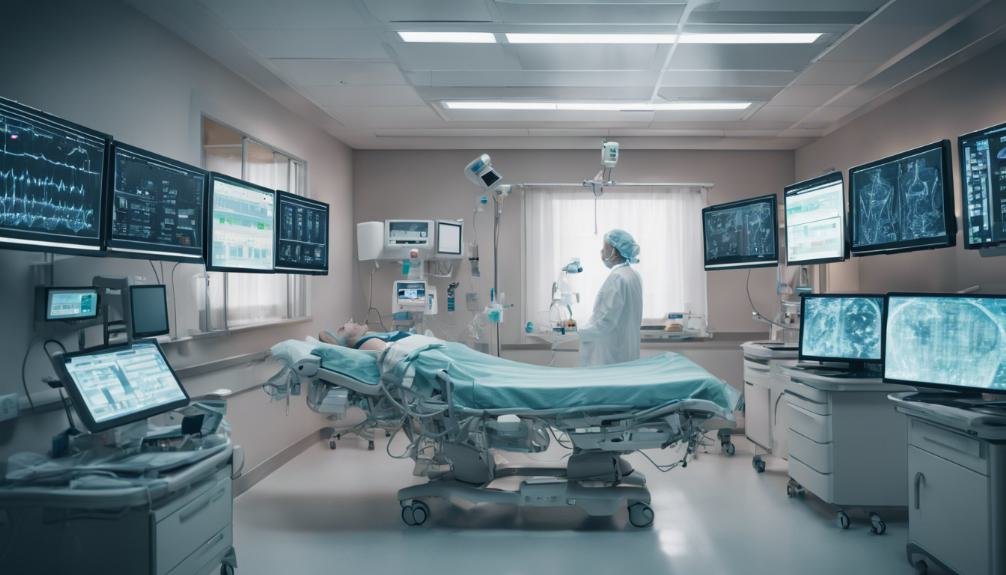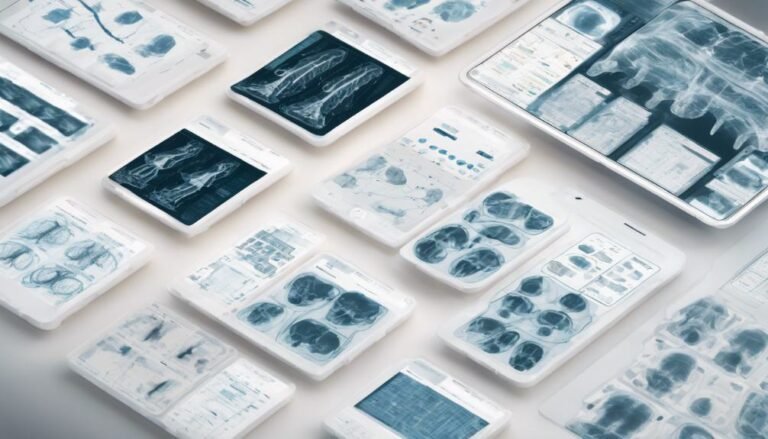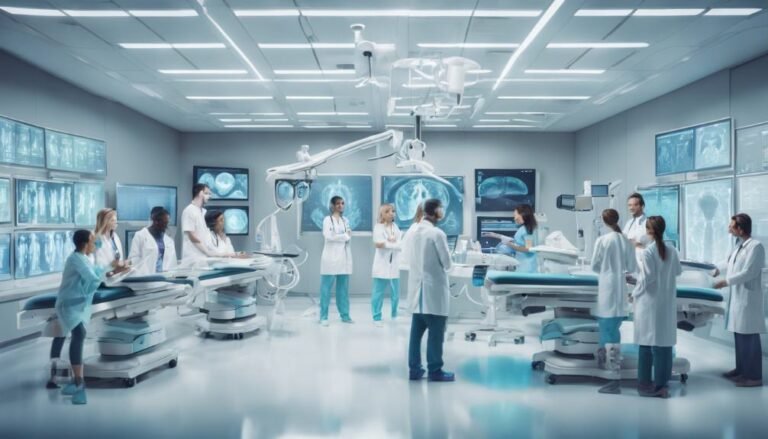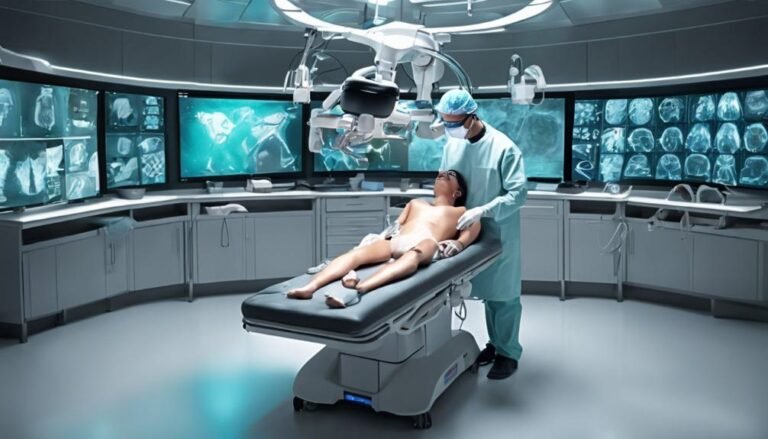AI for Patient Monitoring
Imagine a world where patient health could be monitored and analyzed continuously, providing timely insights and potentially life-saving interventions. AI technology has paved the way for such advancements in healthcare, offering a glimpse into a future where patient care is personalized and optimized like never before. The possibilities are vast, and the impact on healthcare delivery is profound.
Key Takeaways
- AI enables real-time analysis of patient vital signs.
- Proactive interventions based on AI-detected deviations.
- AI tracks subtle changes in health indicators.
- Enhances patient safety with early detection capabilities.
- AI-driven monitoring optimizes healthcare resources.
AI Technology in Healthcare
Utilizing AI technology in healthcare has revolutionized patient monitoring by enabling real-time analysis of essential signs and data for proactive medical interventions. AI algorithms can continuously analyze vast amounts of patient data, such as heart rate, blood pressure, and oxygen levels, to detect subtle changes that may indicate potential health issues. By monitoring these parameters in real-time, healthcare providers can intervene promptly, leading to improved patient outcomes.
AI technology enhances patient monitoring by providing predictive analytics that can forecast potential complications before they escalate. Through machine learning algorithms, AI systems can identify patterns in patient data that may not be apparent to human caregivers. This capability allows for early intervention, thereby preventing adverse events and improving overall patient care.
Furthermore, AI technology in healthcare facilitates personalized medicine by tailoring treatment plans based on individual patient data. By analyzing a patient's unique characteristics, such as genetic makeup and medical history, AI can recommend customized interventions that are more effective in improving patient outcomes. This level of precision medicine has the potential to revolutionize healthcare delivery, making treatments more efficient and patient-centric.
Benefits of AI Monitoring
You can harness the power of AI monitoring for real-time data analysis, facilitating prompt interventions based on accurate information.
AI systems offer early detection capabilities, enabling healthcare providers to identify potential issues before they escalate, ultimately improving patient outcomes.
Real-Time Data Analysis
Fundamentally, real-time data analysis through AI monitoring provides immediate insights into patient health status and potential risks. By utilizing machine learning algorithms, AI systems can continuously monitor patient data, ensuring high data accuracy and timely analysis. This real-time monitoring allows for the prompt identification of any deviations from normal health parameters, enabling healthcare providers to intervene swiftly and improve patient outcomes.
Machine learning algorithms embedded in AI monitoring systems can quickly analyze vast amounts of patient data in real-time, detecting patterns or anomalies that may indicate potential health risks. This continuous monitoring not only enhances the efficiency of healthcare processes but also enables proactive interventions that can prevent adverse events.
Moreover, by leveraging real-time data analysis, AI monitoring systems facilitate personalized patient care by providing tailored insights based on individual health data. This targeted approach can lead to more effective treatment strategies, ultimately optimizing patient outcomes.
Fundamentally, real-time data analysis through AI monitoring empowers healthcare professionals with the tools needed to deliver timely, accurate, and personalized care to patients.
Early Detection Capabilities
AI monitoring's early detection capabilities greatly enhance patient care outcomes by swiftly identifying potential health risks through real-time analysis of patient data. By leveraging AI algorithms and machine learning, healthcare providers can implement early intervention strategies based on continuous monitoring of essential signs and other health indicators. These advanced technologies enable the detection of subtle changes or patterns that may indicate an impending health issue, allowing for timely interventions to prevent escalation.
Through the utilization of AI algorithms, patient monitoring systems can analyze vast amounts of data with speed and precision, identifying deviations from baseline parameters that may go unnoticed through traditional monitoring methods. This proactive approach not only enhances patient safety but also optimizes healthcare resources by focusing efforts where they're most needed.
Improved Vital Sign Tracking
Enhanced life sign tracking capabilities have become a cornerstone of AI-driven patient monitoring systems, revolutionizing the way healthcare professionals gather and analyze critical health data.
Wearable devices equipped with advanced sensors now provide real-time monitoring of essential signs such as heart rate, blood pressure, and oxygen saturation. These devices offer a continuous stream of data, enabling personalized care plans tailored to individual patient needs.
By leveraging AI algorithms, healthcare providers can detect subtle changes in essential signs that may indicate deteriorating health conditions, allowing for early intervention and proactive treatment. The integration of wearable technology into patient monitoring systems has greatly improved the accuracy and timeliness of life sign tracking, enhancing the overall quality of care delivered to patients.
Moreover, the ability to remotely monitor essential signs through wearable devices enables healthcare professionals to access real-time data without the need for constant physical presence, promoting patient comfort and autonomy.
The seamless integration of wearable technology with AI-driven monitoring systems marks a notable advancement in healthcare, fostering proactive and personalized patient care.
Real-Time Health Data Analysis
You can achieve rapid data insights through real-time health data analysis, allowing for constant monitoring of essential signs with AI technology.
This analysis enables predictive health analytics, giving healthcare providers a proactive approach to patient care and potential health issues.
Rapid Data Insights
Utilizing advanced algorithms and real-time processing techniques, rapid data insights in patient monitoring enable healthcare providers to promptly assess and respond to critical health indicators. Continuous monitoring of patient data through predictive analytics allows for the early detection of potential health issues before they escalate.
By analyzing real-time health data, healthcare professionals can deliver personalized care tailored to individual patient needs. This proactive intervention based on rapid data insights helps in preventing complications, optimizing treatment plans, and improving overall patient outcomes.
Through the integration of AI technologies, healthcare providers can access up-to-the-minute information on essential health metrics, facilitating quick decision-making and timely interventions. Rapid data insights empower medical teams to identify trends, anomalies, and patterns in patient data, guiding them towards targeted interventions and adjustments in care plans.
This dynamic approach enhances the efficiency and effectiveness of patient monitoring processes, ultimately leading to better healthcare outcomes and improved patient experiences.
Monitoring Vital Signs
Real-time analysis of key signs in patient monitoring involves constantly evaluating essential health metrics to detect potential issues promptly and guide targeted interventions for improved patient outcomes. Remote monitoring through wearable devices has revolutionized healthcare by enabling continuous tracking of vital signs outside traditional clinical settings. These wearable devices collect real-time data on parameters like heart rate, blood pressure, and oxygen saturation, providing a detailed picture of a patient's health status.
The integration of telehealth services further enhances remote monitoring capabilities, allowing healthcare providers to access and analyze vital sign data from a distance. AI algorithms play a pivotal role in processing this vast amount of real-time health information, enabling quick identification of abnormalities or trends that may indicate deterioration in a patient's condition.
Predictive Health Analytics
Predictive health analytics involves leveraging AI algorithms to analyze real-time health data for proactive identification of potential health issues. By utilizing wearable technology that continuously monitors essential signs and other health metrics, predictive modeling can anticipate health problems before they manifest. This proactive approach enables healthcare providers to intervene early, potentially preventing serious complications.
Through predictive health analytics, personalized treatment plans can be developed based on an individual's unique health data. These plans take into account factors such as genetic predispositions, lifestyle choices, and real-time health information gathered from wearable devices. By tailoring interventions to the specific needs of each patient, proactive healthcare becomes more effective and efficient.
The integration of AI in predictive health analytics streamlines the process of analyzing vast amounts of data quickly and accurately. This allows healthcare professionals to make informed decisions promptly, leading to improved patient outcomes. By embracing this technology, the healthcare industry can shift towards a more preventative care model that focuses on maintaining wellness rather than just treating illness.
Enhanced Diagnosis Accuracy
To improve diagnostic accuracy in patient monitoring, AI algorithms analyze a wide range of data inputs to detect patterns and anomalies efficiently. In the domain of medical imaging, AI plays an essential role in enhancing accuracy. By scrutinizing complex images such as MRIs, X-rays, and CT scans, AI algorithms can identify subtle abnormalities that might be overlooked by human eyes, leading to more precise diagnoses.
Additionally, AI aids in improving the precision of diagnostic tools. Through continuous learning and adaptation, AI-powered diagnostic tools can refine their accuracy over time, ensuring consistency in detecting diseases and conditions. This precision improvement results in earlier detection of potential health issues, enabling timely intervention and treatment.
Remote Patient Monitoring
Remote patient monitoring systems facilitate continuous tracking of essential health parameters outside traditional healthcare settings. These systems leverage technology to monitor patients remotely, enabling healthcare providers to access real-time data without the need for in-person visits.
Remote monitoring efficiency is enhanced through the integration of AI algorithms that can analyze the data collected and identify patterns or anomalies that may indicate changes in a patient's health status.
By utilizing AI for patient outcomes, remote monitoring systems can provide more personalized care based on individual data trends. For example, AI algorithms can predict potential health issues based on historical data, allowing for early intervention and prevention strategies.
This proactive approach can lead to improved patient outcomes and a reduction in emergency room visits or hospital readmissions.
Challenges of AI Implementation
Implementing AI in patient monitoring systems poses significant challenges related to data privacy, algorithm accuracy, and regulatory compliance. Ethical considerations play a pivotal role in ensuring that patient data is handled with the utmost care and confidentiality. Data privacy concerns arise due to the sensitive nature of health information, necessitating robust security measures to safeguard against unauthorized access or breaches.
Algorithm accuracy is another key challenge in AI implementation for patient monitoring. Ensuring that algorithms provide reliable and precise insights requires rigorous testing, validation, and continuous monitoring to minimize the risk of errors that could impact patient care.
Moreover, regulatory compliance adds another layer of complexity to AI implementation in healthcare. Adhering to strict regulations and standards set forth by governing bodies is essential to guarantee that patient monitoring systems meet legal requirements and operate ethically within the healthcare industry.
Addressing these implementation challenges while prioritizing data privacy and regulatory compliance is paramount to the successful integration of AI in patient monitoring systems.
Future of AI in Healthcare
AI's role in reshaping healthcare extends beyond current challenges to offer transformative opportunities for improving patient care and outcomes. The future of AI in healthcare holds immense promise, particularly in the domains of AI-driven diagnostics and personalized treatment.
AI algorithms can analyze vast amounts of patient data to aid in early disease detection, treatment planning, and monitoring of therapeutic effectiveness. By leveraging machine learning and predictive analytics, healthcare providers can offer more tailored and effective interventions, leading to better patient outcomes.
However, the increased reliance on AI in healthcare also raises important ethical implications, particularly concerning patient privacy. As AI systems gather and analyze sensitive health information, ensuring data security and maintaining patient confidentiality become critical concerns.
Striking a balance between harnessing the power of AI for improved healthcare delivery while upholding ethical standards and protecting patient privacy will be a key challenge moving forward. As the field continues to evolve, addressing these ethical considerations will be essential in maximizing the benefits of AI in healthcare.
Conclusion
To summarize, AI for patient monitoring offers unparalleled benefits in healthcare by providing real-time analysis of vital signs, enhancing diagnosis accuracy, and enabling remote patient monitoring.
As the future of healthcare continues to evolve, integrating AI technology will unquestionably revolutionize patient care and improve overall outcomes.
Embrace the power of AI monitoring to optimize medical interventions and guarantee patient safety.
The future of healthcare is here, and AI is leading the way towards a healthier tomorrow.







